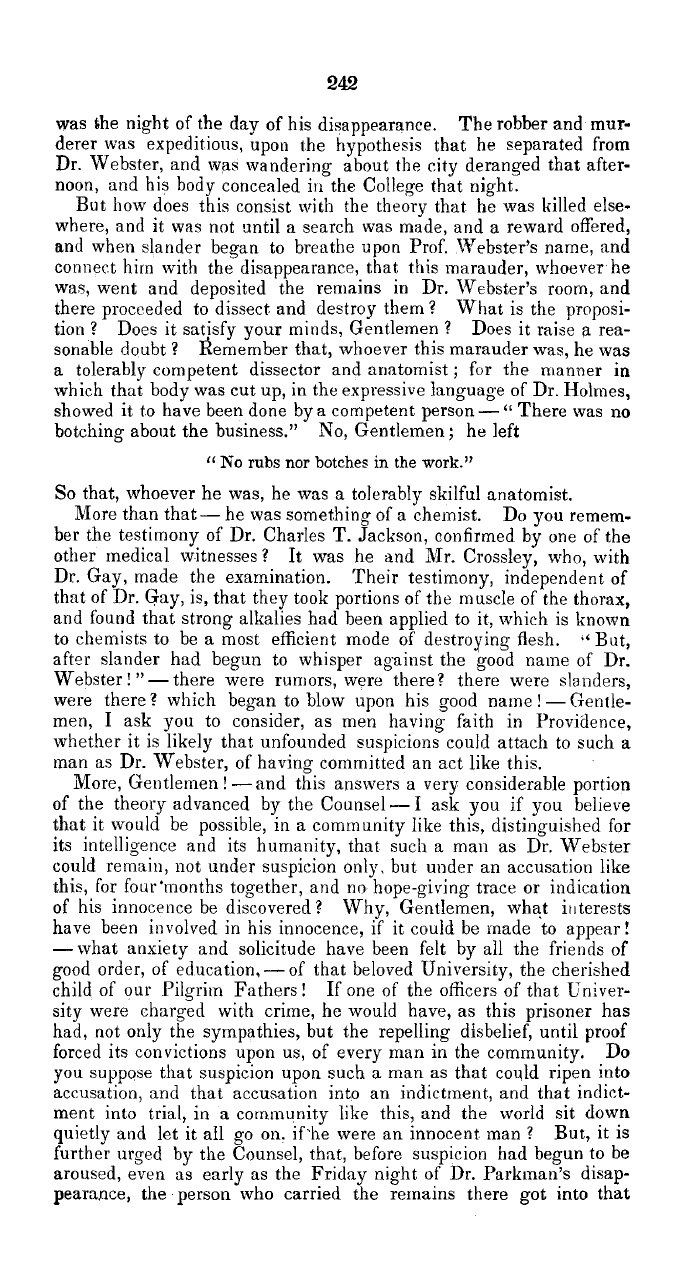|
242
was the night of the day of his disappearance. The robber and mur-
derer was expeditious, upon the hypothesis that he separated from
Dr. Webster, and was wandering about the city deranged that after-
noon, and his body concealed in the College that night.
But how does this consist with the theory that he was killed else-
where, and it was not until a search was made, and a reward offered,
and when slander began to breathe upon Prof. Webster's name, and
connect him with the disappearance, that this marauder, whoever he
was, went and deposited the remains in Dr. Webster's room, and
there proceeded to dissect and destroy them? What is the proposi-
tion ? Does it satisfy your minds, Gentlemen ? Does it raise a rea-
sonable doubt ? Remember that, whoever this marauder was, he was
a tolerably competent dissector and anatomist ; for the manner in
which that body was cut up, in the expressive language of Dr. Holmes,
showed it to have been done by a competent person- °° There teas no
botching about the business." No, Gentlemen; he left
11 No rubs nor botches in the work."
So that, whoever he was, he was a tolerably skilful anatomist.
More than that- he was something of a chemist. Do you remem.
her the testimony of Dr. Charles T. Jackson, confirmed by one of the
other medical witnesses ? It was he and Mr. Crossley, who, with
Dr. Gay, made the examination. Their testimony, independent of
that of Dr. Gay, is, that they took portions of the muscle of the thorax,
and found that strong alkalies had been applied to it, which is known
to chemists to be a most efficient mode of destroxing flesh. ;, But,
after slander had begun to whisper against the good name of Dr.
Webster! "-there were rumors, were there? there were slanders,
were there? which began to blow upon his good name ! - Gentle-
men, I ask you to consider, as men having faith in Providence,
whether it is likely that unfounded suspicions could attach to such a
man as Dr. Webster, of having committed an act like this.
More, Gentlemen ! -and this answers a very considerable portion
of the theory advanced by the Counsel -I ask you if you believe
that it would be possible, in a community like this, distinguished for
its intelligence and its humanity, that such a man as Dr. Webster
could remain, not under suspicion only, but under an accusation like
this, for four 'months together, and no. hope-giving trace or indication
of his innocence be discovered? Why, Gentlemen, what interests
have been involved in his innocence, if it could be made `to appear!
-what anxiety and solicitude have been felt by all the friends of
good order, of education,-of that beloved University, the cherished
child of our Pilgrim Fathers! If one of the officers of that Univer-
sity were charged with crime, he would have, as this prisoner has
had, not only the sympathies, but the repelling disbelief, until proof
forced its convictions upon us, of every man in the community. Do
you suppose that suspicion upon such a man as that could ripen into
accusation, and that accusation into an indictment, and that indict-
ment into trial, in a community like this, and the world sit down
quietly and let it all go on, if'he were an innocent. man ? But, it is
further urged by the Counsel, that, before suspicion had begun to be
aroused, even as early as the Friday night of Dr. Parkman's disap-
pearance, the person who carried the remains there got into that
|

